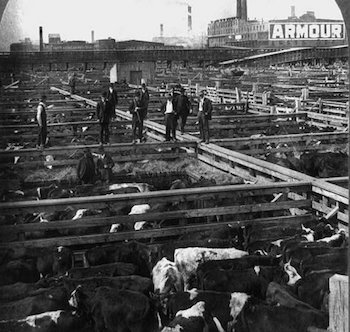A Nation of Meat

It’s not just that our meatpacking system is a crime against both animal and humanity long before COVID-19. It’s that the idea of going a day without meat is counter to what it means to be an American. I am not surprised at all that the big “let’s force them back to work regardless of who dies!” push came the exact moment that the meat supply was threatened. People from nearly all cultures love meat. But the eating of meat has been pretty rare in most of the world until recently and for few is its daily consumption such a central part of the nation’s psychology. But this is hardly new. Americans have always eaten obscene amounts of meat. Reading European descriptions of American food in the 19th century is a fun exercise, because they complain constantly about disgusting amounts of meat topped by ludicrously sweet desserts. Jane Ziegelman has more on this.
That President Trump rushed to issue an executive order that aims to keep meat processors on the job, while hesitating to take similar action to ramp up the manufacturing of protective gear for medical workers, no doubt reflects the influence of lobbyists for the meat industry. But there’s something else to consider. The perceived essentialness of cheeseburgers (and other meat products) is also a function of certain distinctly American food habits and beliefs.
Both have deep roots. Though strongly influenced by Britain, 19th-century American cuisine differed from the motherland in at least two important respects. In her 1832 travel book, “Domestic Manners of the Americans,” the English writer Frances Trollope describes the breathtaking quantities of food on American dinner tables. Even tea, she reports, is a “massive meal,” a lavish spread of many cakes and breads and “ham, turkey, hung beef, apple sauce and pickled oysters.”
Equally impressive to this foreign observer were the carnivorous tendencies of her American hosts. “They consume an extraordinary amount of bacon,” she writes, while “ham and beefsteaks appear morning, noon and night.”
Americans were indiscriminate in their love for animal protein. Beef, pork, lamb and mutton were all consumed with relish. However, as pointed out by the food historian Harvey Levenstein, it was beef, the form of protein preferred by the upper class, “that reigned supreme in status.” With the opening of the Western frontier in the mid-19th century, increased grazing land for cattle lowered beef prices, making it affordable for the working class.
Dietary surveys conducted at the turn of the 20th century by Wilbur Atwater, father of American nutrition, revealed that even laborers were able to have beefsteak for breakfast. As Atwater was quick to point out, a high-protein diet set American workers apart from their European counterparts. On average, Americans ate a phenomenal 147 pounds of meat a year; Italians, by contrast, consumed 24.
“Doubtless,” Atwater wrote, “we live and work more intensely than people do in Europe.” The “vigor, ambition and hopes for higher things” that distinguished the American worker, he argued, was fed by repeated helpings of T-bone and sirloin steak.
As of 2009, the U.S. was the highest consumer of meat per capita in the world, just ahead of Kuwait (new money) and Australia (similar history to the U.S.). I don’t think anything has changed since then. As Ziegelman points out, there are lots of cuisines that are perfectly delicious without meat at all (meat-free pastas) or which use quite small amounts of meat in food (much of Chinese for instance) that can feed people easily without putting workers at nearly as much risk. But it’s like the sense of abundance that the first English colonists felt upon reaching American shores that led them to completely abandon the quite sophisticated conservation measures of England (even if those were forced upon them by scarcity) and kill every animal and cut down every tree have never left us. We eat meat because we’re Americans damn it and nothing is going to get in the way of that.
I don’t know how to change that psychology, but it’s a deadly one and one with huge implications for climate as well as for meatpackers’ health.


